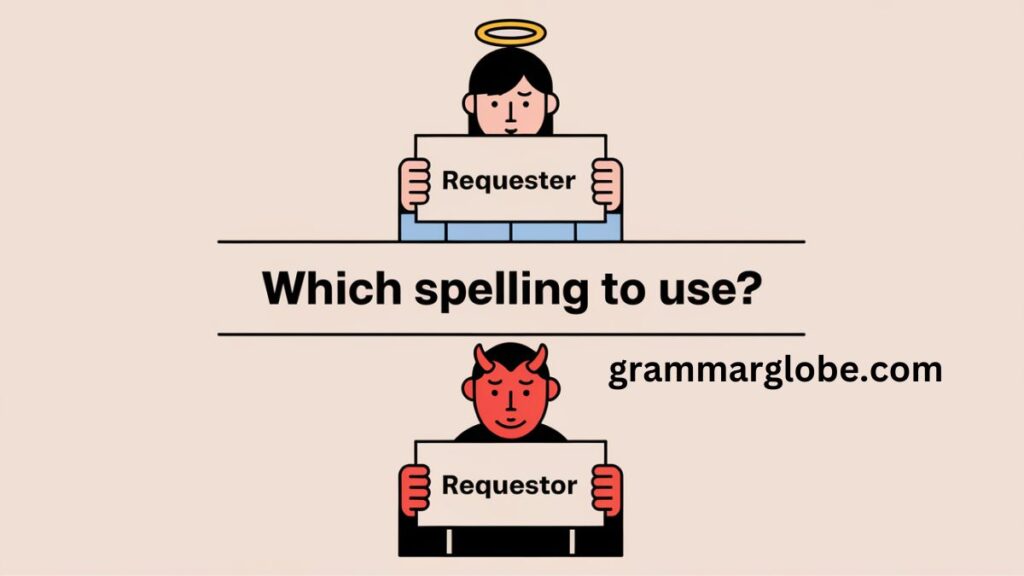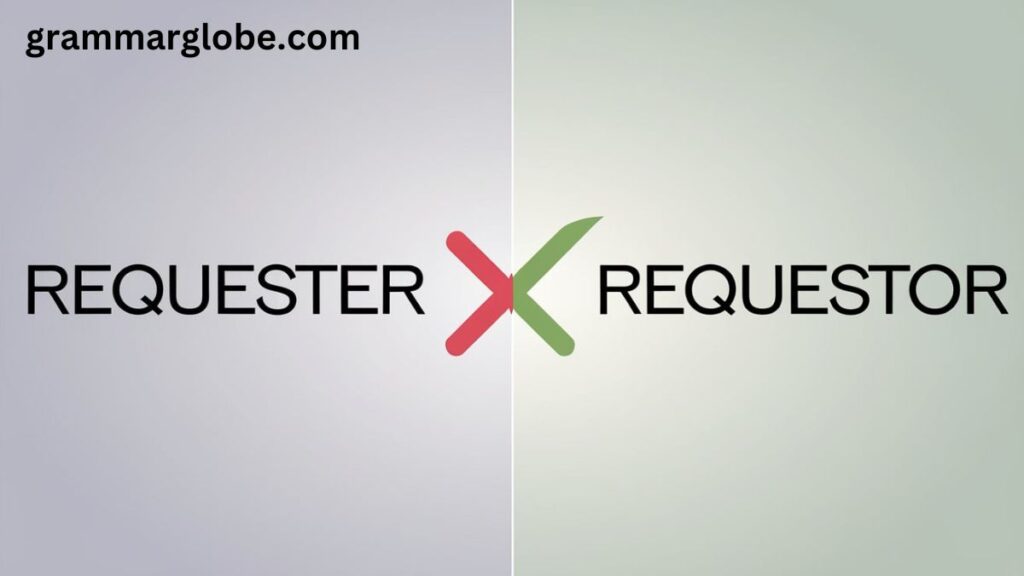The words “requester” and “requestor” often cause confusion, even for experienced writers. Although both terms refer to the person who makes a request, their use differs depending on the context, formality, and specific field of communication. If you’ve ever found yourself wondering which spelling is correct for a particular situation, you’re not alone.
In this comprehensive guide, we’ll not only break down the differences between requester and requestor, but we’ll also explain the historical origins, when each term is most appropriate, and provide practical tips on how to choose between them. Let’s get started!
Understanding the Difference Between Requester and Requestor
At its core, requester and requestor mean the same thing: a person who makes a request. However, subtle differences in their usage arise from factors like formality, context, and audience. So, let’s clarify how these two terms are applied in various situations.

Requester – The More Common Choice
Requester is the most widely used form, particularly in everyday communication, customer service, and project management. It has become the standard term in many industries because it’s simple, straightforward, and easy to understand.
Requestor – The More Formal Alternative
Requestor, though not as commonly used, has its place in more formal settings such as legal documents, technical fields, and structured processes. Its use often signals a higher degree of formality or precision.
While the meanings of both words are identical, the key difference comes down to style and context. So, which one should you choose? Let’s explore when each term is used and why.
Origins of the Terms
Both requester and requestor come from the Latin word “requestus”, meaning “to ask” or “to demand.” The evolution of both terms stems from the Latin verb “requīrere”, which means “to search for” or “to ask for.”
- Requester likely emerged as the more common form because of its simplicity and ease of use. It became the standard term in many informal and business contexts.
- Requestor, on the other hand, grew in popularity in legal, technical, and formal communication, where precision and clarity are paramount.
Thus, while both terms are technically correct, their use depends on who you’re writing for and the tone of your communication.
When to Use Requester
In most situations, requester is the safer choice. It’s the more informal and approachable of the two, and it’s appropriate in most professional settings that aren’t too technical or legal.

Customer Service
Requester is common in customer service communication, where clarity and simplicity are essential. In these situations, you want to use language that’s easy for clients or customers to understand. The goal is to be clear and concise while maintaining a friendly tone.
Example:
- “The requester submitted a support ticket regarding an issue with their account.”
- “Our requester has reached out to inquire about the status of their refund.”
Why requester works here: In customer service, the language should be approachable, and the tone should be friendly. Requester is a natural fit because it keeps the communication casual without losing professionalism.
Project Management
In project management, the term requester often refers to someone who initiates a request for resources, approvals, or task completion. Using requester in this context ensures the communication remains straightforward and understandable by all stakeholders, from project leads to team members.
Example:
- “The requester has submitted a formal request for additional resources for the project.”
- “The project manager will review the request made by the requester before proceeding.”
Why requester works here: Project management communications tend to focus on efficiency and clarity. Using requester allows for smooth and clear communication, which is vital for team collaboration.
When to Use Requestor
In more formal, technical, or legal contexts, requestor is the preferred choice. Let’s take a look at the scenarios where requestor is most appropriate.

Legal Documents
In legal documents, precision is everything. The language used in contracts, agreements, or petitions needs to be clear and unambiguous. In these cases, requestor conveys a sense of formality and officiality that is often required in legal writing.
Example:
- “The requestor has submitted a formal petition to the court requesting a review of the decision.”
- “The requestor must present evidence within the timeframe specified in the agreement.”
Why requestor works here: Legal writing demands precision and formality. Using requestor contributes to a professional tone and helps establish the seriousness of the communication.
Structured Processes in IT or Compliance
In fields such as IT, compliance, and other highly regulated industries, documentation follows strict guidelines. Requestor is the term of choice when referring to individuals who initiate official requests within these frameworks.
Example:
- “The requestor must complete the proper forms before gaining access to sensitive systems.”
- “All requestor requests are subject to review by the compliance team.”
Why requestor works here: In these industries, documentation needs to be structured and official. Requestor fits this environment because it aligns with the technical language often used in these fields.
Key Differences in Contextual Usage
To help clarify, let’s take a closer look at the key differences between the two terms in various contexts:
| Context | Requester | Requestor |
|---|---|---|
| Customer Service | Frequently used in everyday settings and emails to clients. | Rarely used. |
| Project Management | Used for requests related to tasks, resources, and changes. | Sometimes used in formal requests for project adjustments. |
| Legal Documents | Uncommon, unless the setting is informal. | Commonly used in contracts, petitions, and formal agreements. |
| IT or Compliance | Can be used, but may be seen as informal in documentation. | Preferred for requests within official IT and compliance procedures. |
| Formal Communication | Generally more casual, fitting for business emails and internal communication. | Perfect for formal, structured environments and legal documents. |
As shown, requester tends to be more casual and appropriate for everyday business, while requestor is typically reserved for more formal and technical environments.
Formal Communication vs. Informal Scenarios
When deciding between requester and requestor, it’s essential to consider the formality of the situation.
Formal Communication
In formal communication, such as legal contracts, formal requests, and official documents, requestor is the better choice. The tone of these documents often requires higher precision, which requestor helps convey.
For instance, when drafting a legal petition, the language needs to be precise, so using requestor maintains the formality required in legal contexts.
Informal Contexts
On the other hand, in informal contexts such as internal emails, team communication, and even customer service emails, requester is more fitting. It keeps the tone light, friendly, and approachable, making it easier for your audience to engage with the message.
Synonyms for Requester/Requestor
While requester and requestor are the most common terms, you might also encounter various synonyms for both, depending on the context. Here are some of the most common alternatives:

- Applicant: A person who applies for something, often used in formal contexts like job applications.
- Petitioner: Common in legal contexts, a petitioner formally requests something, such as a review or action from a court.
- Initiator: A person who starts a process or project.
- Seeker: Someone who is actively looking for something, such as information, support, or assistance.
- User: Common in technical or customer service contexts, particularly when referring to people requesting service or information.
Each synonym carries its own nuance, and the choice depends on what exactly the person is requesting and the level of formality involved.
Practical Tips for Choosing the Right Term
Choosing the right word—requester or requestor—depends on several factors. Here are some practical tips to help guide your decision:

- Consider the Context:
- Is the request in a legal document or contract? Use requestor.
- Is the request part of an informal conversation or internal email? Opt for requester.
- Assess the Tone:
- If you need a formal, professional tone, requestor is the way to go.
- If the tone is casual and conversational, requester works better.
- Think About Your Audience:
- For clients, customers, or general communication, requester is more natural and accessible.
- For legal teams, IT professionals, or compliance officers, use requestor.
- Readability:
- Requester is the simpler, easier-to-read option, particularly in everyday communications.
- Requestor should be reserved for formal contexts, where clarity and precision are crucial.
Conclusion
In summary, while requester and requestor mean the same thing, their contextual usage differs significantly.
- Use requester in everyday communication, customer service, project management, and informal settings.
- Use requestor in legal documents, technical fields, and formal situations where precision and professionalism are key.
Understanding when and how to use these terms based on the formality of the communication and the audience will help you communicate more effectively and professionally. Choose wisely, and your writing will sound clear, accurate, and appropriate for the setting.
Next time you write an email, prepare a legal contract, or communicate with clients, consider whether requester or requestor is the best choice to convey your message with the right tone and clarity.
FAQs
1. What’s the difference between “Requester” and “Requestor”?
Both words mean the same: someone who makes a request. The difference lies in context; requester is more common in informal settings, while requestor is used in formal or legal contexts.
2. Which is more commonly used, “Requester” or “Requestor”?
Requester is more widely used, especially in customer service, emails, and project management. It’s simpler and more accessible for most situations.
3. Is “Requestor” preferred in legal writing?
Yes, requestor is commonly used in legal documents, contracts, and technical fields where precision and formality are needed.
4. Can I use “Requester” in professional emails?
Absolutely. Requester is ideal for professional but informal communication, such as emails or internal memos, as it sounds approachable and clear.
5. Are both “Requester” and “Requestor” grammatically correct?
Yes, both terms are grammatically correct, but their usage depends on the tone and formality of the situation.

Oliver Smith is an experienced blogger at Grammar Globe, Oliver Smith, an expert in English grammar and a master of wit, brings language to life with his playful take on puns. Through his works, he weaves humor into the rules of grammar, making learning fun and engaging for readers of all ages. Discover language with a smile!”







